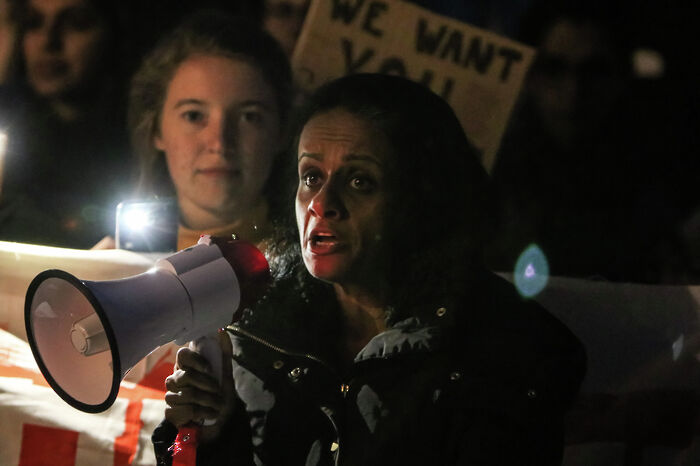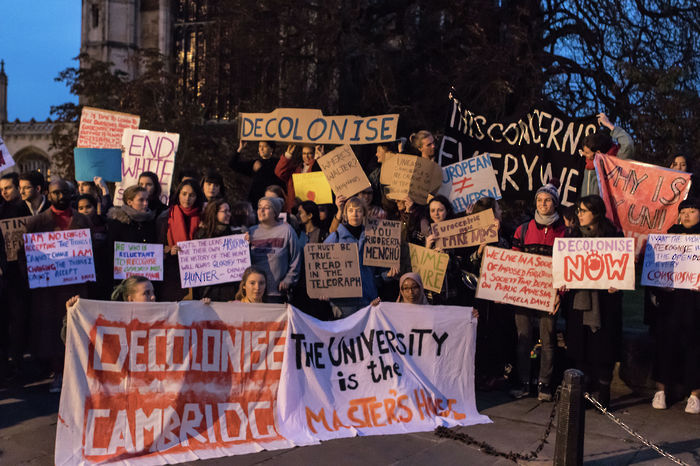Decolonisation efforts branch out across faculties
Approaches to decolonising the curriculum have taken on individualised characters as they spread across various University faculties

Student Poppy Lindsley has described her efforts to decolonise the Classics curriculum as being “about challenging the way things have been done and the consequences of the way things have been done.”
The campaign, which launched at the beginning of Michaelmas term, is one part of a mobilisation mounting steadily in various pockets of the University. This has seen campaigns launched in faculties where questions of decolonisation had not been previously addressed collectively, including Classics, Philosophy and Linguistics.
This term alone has seen preliminary meetings set up in the Philosophy department, a survey sent out to all Modern and Medieval Languages (MML) and Linguistics students, and a forum in the Classics faculty. The forum took place yesterday night, and brought together an estimated 70 students and fellows to question the existing notion of Classics, and reflect on what Classics meant to them, as well as what it could be.
Most recently, the Social Anthropology department’s campaign saw a landmark achievement in response to their efforts – the introduction of a World Theory lecture series.
As organisers in different faculties emerge with their ideas, decolonisation efforts have become more disparate, and individualised to faculties. Even with common goals, its exact manifestations differ across different subjects. Speaking to Varsity, three campaigners in the politics department emphasised making changes in how their curriculum is taught, instead of approaches which seek more to include certain thinkers, such as women or BME writers, in reading lists.
One campaigner said: “[We realised] that there are significant limitations to that approach because it can be tokenistic, as well as buying into the idea that just because someone has a certain skin colour they are worth reading.”
Essay questions in Politics, for example, still centre around Europe. One campaigner said that their essay choices “were all along the lines of, ‘what can Europe learn from Gandhi?’”, leaving them to wonder “why we can’t answer questions on Gandhi in his own historicised context.”
“So instead, we focussed on how it is taught”, which, they explained, “states we need to historicise arguments to understand them fully. We hold that that principle [of historicisation] hasn’t reached its full conclusion.”
Their sentiments were echoed by one student campaigner in Linguistics, Anki Deo. Deo described two camps in linguistic thought: the generativists, who, between the two aspects of language – competence, which is how your brain performs language, and performance, which is “how it comes out of your mouth” – engage primarily with the former, and structuralists, who emphasise the need to understand language in light of elements of human culture.
Cambridge, Anki said, falls firmly in the former camp. “It’s a department with a very specific outlook”, she said, adding: “they don’t mean to, but they’re glossing over [the] social impact of language.”
However, she said: “There is so much to know that you can’t falsify or test, and I still think that’s valuable”.
She described her personal experience of exploring the social impact of language. She said, “I’ve been looking it up and putting it into my essays, but it’s quite difficult to do that because obviously it takes so much extra labour on your part.” Deo said this often culminates in a “throwaway paragraph” in essays because “the question is never asking you to do this stuff, it’s more of me doing it to make the piece of work feel bearable, and to feel like [there’s] a point in it.” Plus, she added, “It’s really tough to do because there is no one official who can give you advice on this kind of stuff.”
In Classics, as Lindsley, Khan and Irvine put it, the lines are blurred in their own way. “Classics can be anything, which is why it’s a weird subject”, Lindsley said. Her sentiments were echoed by Khan, who asked: “What constitutes a classic?”
Part of their effort is trying to answer this. “I think for me a lot if it is trying to unpick 19th century scholarship”, Irvine said. She described hearing her sentiments echoed in a lecture on Greek Novel. One of the first things her lecturer did was give a speech about “how we’re constantly trying to unpick the consequences of 19th century scholarship on the way that we study Classics.”
“That was a really good moment for us”, she remarked. Later, she added: the reception of Sappho, for example, is “really interesting”. “She was supposed to be a lesbian poet”, whose visual image in the 19th century has been filled with scholarship saying “she was repugnant to men and that’s why she was a lesbian”, or, “she was short and ugly”. Irvine said: “we have no evidence of what Sappho looked like, but we have so much evidence of what they said she was. We’re still dealing with those kinds of problematic interpretations of Classics.”
Lindsley describes two main threads in what it means to decolonise the Classics curriculum: “The one way is to look at evidence we have from Europe from a different point of view, the other way is to look at other evidence”. Khan pointed out, however, that compared to English and Philosophy, where we can seek writers outside of Europe, sources outside of the curriculum are scarcer, an element of the subject which brings its own challenges.
Campaigners in the MML faculty, on the other hand, have honed in on the lack of representation in the reading lists themselves. “We want to normalise the non-white authors from first year, so when it is an option later on in the degree it is not some supplementary, niche option.” Galaxy Henry, a student pushing to decolonise the MML curriculum, described her first year: she encountered almost no non-white authors, which was what motivated her to “[broaden] the perspective of the reading list”.
Support for the campaigns has been marked by positivity. In the Classics department, support has never wavered, even in the face of logistical hiccups due to ongoing strike action. One fellow approached them to say, “[it’s] really good, keep moving”. Henry echoed this, noting similar responses in the MML faculty. One politics campaigner mentioned that they have received repeated invitations from the faculty to engage in discussion, describing “a lot of allies in the department”.
Campaigners in the Politics department noted, however, that: “the biggest enemy is institutional lag.” They explained that although “in politics we don’t see a significant antagonism from the student side”, the problem, on an institutional level, is that “movements spring up, then don’t stay.” They say this is why they “are so insistent on an institutionalised feedback mechanism with the faculty so that the progress has not gone to waste.”
 News / Eight Cambridge researchers awarded €17m in ERC research grants27 December 2025
News / Eight Cambridge researchers awarded €17m in ERC research grants27 December 2025 News / News in Brief: carols, card games, and canine calamities28 December 2025
News / News in Brief: carols, card games, and canine calamities28 December 2025 News / Downing investigates ‘mysterious’ underground burial vault 29 December 2025
News / Downing investigates ‘mysterious’ underground burial vault 29 December 2025 Interviews / Meet Juan Michel, Cambridge’s multilingual musician29 December 2025
Interviews / Meet Juan Michel, Cambridge’s multilingual musician29 December 2025 Sport / Hard work, heartbreak and hope: international gymnast Maddie Marshall’s journey 29 December 2025
Sport / Hard work, heartbreak and hope: international gymnast Maddie Marshall’s journey 29 December 2025









